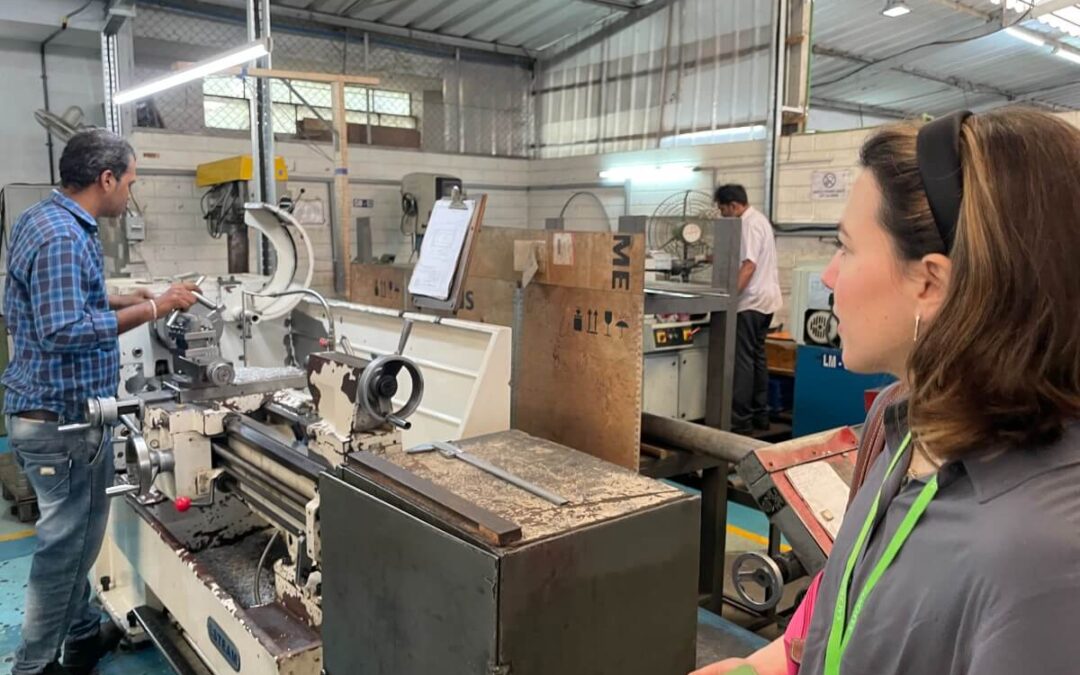The ten-day delegation trip to South India, led by Saxony’s State Minister for Economic Affairs, Labour and Transport, Martin Dulig, was all about international cooperation and securing skilled workers between the Indian states of Tamil Nadu and Kerala and the Free State of Saxony. Coimbatore, Chennai and Cochin were on our programme, each location with its own highlights and insights, particularly for the further development of our recruiting and relocation services.
Innovative spirit at the IIT Madras Research Park
We experienced an outstanding example of the spirit of innovation in India at the Research Park of the Indian Institute of Technology Madras (IIT Madras). The Research Park is the first university research park in India and the start-up scene based there impressed us with its density of innovation and creativity based on practical and modern solutions. More than 200 technology start-ups have the opportunity to further develop their business field and exchange ideas with other founders at the Research Park. The facility has already paid off: the value of the companies is now estimated at over 8 billion US dollars. This place not only offers young, up-and-coming companies a first-class research infrastructure, but is also a living testimony to how pragmatism and creativity can go hand in hand to develop future-proof technologies and business models. Joint ventures between Saxon companies and some local start-ups were already emerging during our visit. We are excited to see what the future holds in this regard!
Meaningful encounters at the University of Cochin
Our visit to the Department of Computer Science & Engineering at the University of Cochin gave us a deep insight into the academic world of India and campus recruiting there. The opportunity to speak directly with students about their career aspirations and visions for the future was not only inspiring, but also emphasised the importance of cooperation between universities, research institutions and partners in promoting and recruiting Indian talent for Saxony. After all, as we learnt not least from conversations with students, but also from the daily newspaper ‘The Indian Express’, many young students in India are highly motivated to come to Germany for further studies. 32.6 per cent now prefer studying in Germany to studying in Canada or the USA. The reasons for this are the lower cost of living in Germany and the very attractive opportunity to gain work experience as a working student during their studies and get paid for it.

Networking and future cooperation
A key aspect of the trip was establishing and maintaining contacts. The interactions with the other delegation participants as well as the company and university representatives created a very good basis for future cooperation. These contacts are essential in order to achieve the common goals in the areas of securing skilled labour, education and economic cooperation. Everyone involved agrees that cooperation with India on the topic of recruiting skilled labour is of fundamental importance and will continue to be in the future. India will become an important location for Saxony in the future, especially in view of the great shortage of very well-trained engineers and skilled labour. It is positive to emphasise that the majority of the participating companies are definitely open to recruiting skilled workers from India. The trip showed more than ever that the working methods and cultures of Germany and India are a very good match.

Culinary and cultural discoveries
In addition to the professional aspects of our trip, we also had ample opportunity to experience the cultural diversity of South India. By tasting South Indian specialities, we got to know the culinary delights of the region and gained an insight into the rich cultural history of India. These cultural impressions contributed significantly to making our trip a special experience.

An all-round successful trip
The trip to South India was an impressive demonstration of the opportunities that arise from international cooperation and cultural exchange. By visiting training centres, production facilities and research institutes, we were able to gain valuable insights and establish direct contacts that are essential for our recruiting and relocation services. The experiences and insights gained on this trip are a valuable asset for our future projects and strategies. However, testimonials from Indian professionals and companies have once again made us realise that the extensive bureaucratic processes in Germany for recognising qualifications and applying for visas present enormous hurdles and therefore slow down recruitment considerably. In many cases, the bureaucratic process prevents the recruitment of Indian skilled workers and contributes significantly to the fact that skilled workers look for other international locations. There is still a lot of work to be done here!


